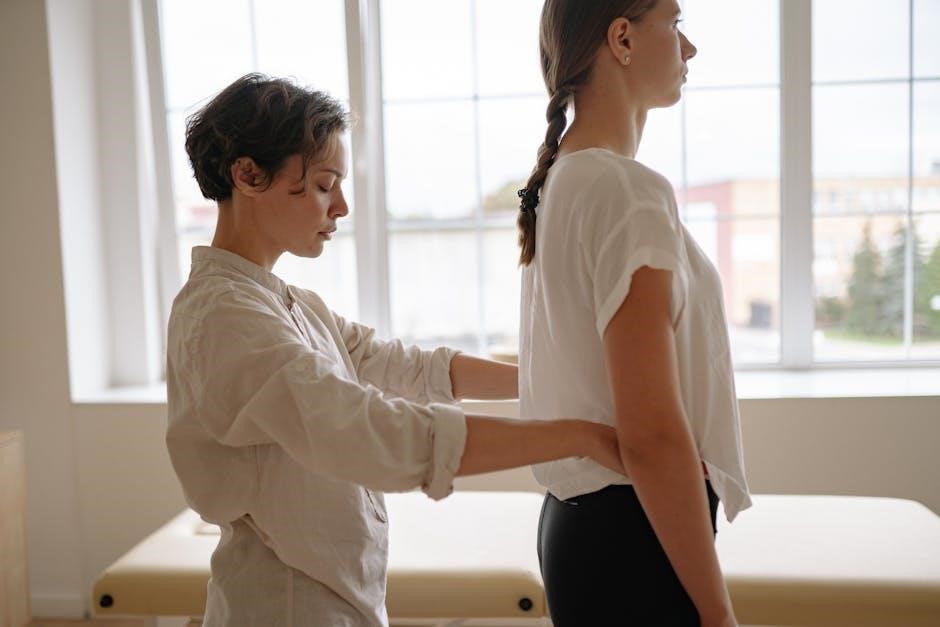Voice therapy exercises are structured activities aimed at improving vocal health and speech clarity. They include downloadable PDF guides with evidence-based practices like Vocal Function Exercises and resonant voice therapy to enhance vocal clarity, strength, and breathing techniques for better voice projection. These exercises are designed to reduce vocal fatigue and strain, promoting effective communication and speech rehabilitation. Regular practice of these exercises can significantly improve voice quality and overall vocal performance. They are often recommended by speech therapists and are accessible for home practice. Key exercises include AH-AH-AH with glottal attack, vowel production, and tongue/lip trills. Proper techniques and consistency are essential for achieving optimal results. Through dedicated practice, individuals can experience noticeable improvements in their vocal abilities and communication skills. These exercises are tailored to address various vocal challenges and are supported by scientific research. They provide a comprehensive approach to voice care and rehabilitation. By following these exercises, individuals can maintain healthy vocal habits and prevent future vocal issues. The structured nature of these exercises ensures gradual progress and measurable outcomes. They are suitable for both therapeutic and preventive purposes. Overall, voice therapy exercises offer a holistic method to enhance and protect one’s voice. Regular engagement with these exercises fosters long-term vocal health and confidence in communication. They are a valuable resource for anyone seeking to improve their voice. With consistent practice, individuals can achieve their vocal goals and maintain optimal speech quality. Voice therapy exercises are a proven method for addressing vocal challenges and enhancing overall communication abilities. They provide a practical and effective approach to voice care. These exercises are widely recognized for their benefits in speech rehabilitation and vocal improvement. By incorporating them into a daily routine, individuals can experience significant enhancements in their vocal clarity and strength. They are an essential tool for anyone looking to improve their voice. The exercises are designed to be accessible and effective, making them a popular choice for voice therapy. Through regular practice, individuals can achieve their vocal goals and maintain healthy vocal habits. Voice therapy exercises are a key component of effective speech rehabilitation. They offer a structured and evidence-based approach to improving vocal health. These exercises are tailored to address specific vocal challenges and promote overall communication skills. By following these exercises, individuals can experience noticeable improvements in their voice quality and clarity. They are a valuable resource for anyone seeking to enhance their vocal abilities. The exercises are supported by scientific research and are widely recommended by speech therapists. Regular practice ensures gradual progress and measurable outcomes. Voice therapy exercises are a comprehensive method for achieving and maintaining optimal vocal health. They provide a practical and effective approach to addressing vocal challenges. These exercises are essential for improving communication skills and preventing future vocal issues. With consistent practice, individuals can achieve their vocal goals and maintain healthy vocal habits. Voice therapy exercises are a proven method for enhancing vocal clarity, strength, and projection. They are a valuable tool for anyone looking to improve their voice. The exercises are designed to be accessible and effective, making them a popular choice for voice therapy. By incorporating them into a daily routine, individuals can experience significant enhancements in their vocal abilities. Voice therapy exercises are a key component of effective speech rehabilitation. They offer a structured and evidence-based approach to improving vocal health. These exercises are tailored to address specific vocal challenges and promote overall communication skills. By following these exercises, individuals can experience noticeable improvements in their voice quality and clarity. They are a valuable resource for anyone seeking to enhance their vocal abilities. The exercises are supported by scientific research and are widely recommended by speech therapists. Regular practice ensures gradual progress and measurable outcomes. Voice therapy exercises are a comprehensive method for achieving and maintaining optimal vocal health. They provide a practical and effective approach to addressing vocal challenges. These exercises are essential for improving communication skills and preventing future vocal issues. With consistent practice, individuals can achieve their vocal goals and maintain healthy vocal habits. Voice therapy exercises are a proven method for enhancing vocal clarity, strength, and projection. They are a valuable tool for anyone looking to improve their voice. The exercises are designed to be accessible and effective, making them a popular choice for voice therapy. By incorporating them into a daily routine, individuals can experience significant enhancements in their vocal abilities. Voice therapy exercises are a key component of effective speech rehabilitation. They offer a structured and evidence-based approach to improving vocal health. These exercises are tailored to address specific vocal challenges and promote overall communication skills. By following these exercises, individuals can experience noticeable improvements in their voice quality and clarity. They are a valuable resource for anyone seeking to enhance their vocal abilities. The exercises are supported by scientific research and are widely recommended by speech therapists. Regular practice ensures gradual progress and measurable outcomes. Voice therapy exercises are a comprehensive method for achieving and maintaining optimal vocal health. They provide a practical and effective approach to addressing vocal challenges. These exercises are essential for improving communication skills and preventing future vocal issues. With consistent practice, individuals can achieve their vocal goals and maintain healthy vocal habits. Voice therapy exercises are a proven method for enhancing vocal clarity, strength, and projection. They are a valuable tool for anyone looking to improve their voice. The exercises are designed to be accessible and effective, making them a popular choice for voice therapy. By incorporating them into a daily routine, individuals can experience significant enhancements in their vocal abilities. Voice therapy exercises are a key component of effective speech rehabilitation. They offer a structured and evidence-based approach to improving vocal health. These exercises are tailored to address specific vocal challenges and promote overall communication skills. By following these exercises, individuals can experience noticeable improvements in their voice quality and clarity. They are a valuable resource for anyone seeking to enhance their vocal abilities. The exercises are supported by scientific research and are widely recommended by speech therapists. Regular practice ensures gradual progress and measurable outcomes. Voice therapy exercises are a comprehensive method for achieving and maintaining optimal vocal health. They provide a practical and effective approach to addressing vocal challenges. These exercises are essential for improving communication skills and preventing future vocal issues. With consistent practice, individuals can achieve their vocal goals and maintain healthy vocal habits. Voice therapy exercises are a proven method for enhancing vocal clarity, strength, and projection. They are a valuable tool for anyone looking to improve their voice. The exercises are designed to be accessible and effective, making them a popular choice for voice therapy. By incorporating them into a daily routine, individuals can experience significant enhancements in their vocal abilities. Voice therapy exercises are a key component of effective speech rehabilitation. They offer a structured and evidence-based approach to improving vocal health. These exercises are tailored to address specific vocal challenges and promote overall communication skills; By following these exercises, individuals can experience noticeable improvements in their voice quality and clarity. They are a valuable resource for anyone seeking to enhance their vocal abilities. The exercises are supported by scientific research and are widely recommended by speech therapists. Regular practice ensures gradual progress and measurable outcomes. Voice therapy exercises are a comprehensive method for achieving and maintaining optimal vocal health. They provide a practical and effective approach to addressing vocal challenges. These exercises are essential for improving communication skills and preventing future vocal issues. With consistent practice, individuals can achieve their vocal goals and maintain healthy vocal habits. Voice therapy exercises are a proven method for enhancing vocal clarity, strength, and projection. They are a valuable tool for anyone looking to improve their voice. The exercises are designed to be accessible and effective, making them a popular choice for voice therapy. By incorporating them into a daily routine, individuals can experience significant enhancements in their vocal abilities. Voice therapy exercises are a key component of effective speech rehabilitation. They offer a structured and evidence-based approach to improving vocal health. These exercises are tailored to address specific vocal challenges and promote overall communication skills. By following these exercises, individuals can experience noticeable improvements in their voice quality and clarity. They are a valuable resource for anyone seeking to enhance their vocal abilities. The exercises are supported by scientific research and are widely recommended by speech therapists. Regular practice ensures gradual progress and measurable outcomes. Voice therapy exercises are a comprehensive method for achieving and maintaining optimal vocal health. They provide a practical and effective approach to addressing vocal challenges; These exercises are essential for improving communication skills and preventing future vocal issues. With consistent practice, individuals can achieve their vocal goals and maintain healthy vocal habits. Voice therapy exercises are a proven method for enhancing vocal clarity, strength, and projection. They are a valuable tool for anyone looking to improve their voice. The exercises are designed to be accessible and effective, making them a popular choice for voice therapy. By incorporating them into a daily routine, individuals can experience significant enhancements in their vocal abilities. Voice therapy exercises are a key component of effective speech rehabilitation. They offer a structured and evidence-based approach to improving vocal health. These exercises are tailored to address specific vocal challenges and promote overall communication skills. By following these exercises, individuals can experience noticeable improvements in their voice quality and clarity. They are a valuable resource for anyone seeking to enhance their vocal abilities. The exercises are supported by scientific research and are widely recommended by speech therapists

What Are Voice Therapy Exercises?
Voice therapy exercises are structured activities designed to improve vocal health, clarity, and strength. They include techniques like Vocal Function Exercises (VFEs), Resonant Voice Therapy, and Accent Method Exercises. These exercises target vocal clarity, breathing, and reducing strain. Many are detailed in downloadable PDF guides, such as AH-AH-AH with glottal attack and vowel production exercises. They are evidence-based practices developed by speech therapists to address specific vocal challenges. Regular practice can enhance communication skills and overall vocal performance. These exercises are tailored to individual needs and are supported by scientific research.

The Importance of Voice Therapy in Speech Rehabilitation
Voice therapy plays a vital role in speech rehabilitation by restoring vocal health and improving communication skills. It addresses vocal challenges such as fatigue, strain, and clarity issues through structured exercises. These exercises, detailed in downloadable PDF guides, are evidence-based and tailored to individual needs. Voice therapy enhances speech quality, confidence, and overall vocal performance, making it a cornerstone of rehabilitation for individuals with voice disorders. Regular practice fosters long-term improvements and supports effective communication. It is widely recommended by speech therapists for its proven benefits in addressing vocal challenges and promoting healthy vocal habits.

Benefits of Voice Therapy Exercises
Voice therapy exercises improve vocal clarity, strength, and projection while reducing fatigue and strain. They enhance breathing techniques, promote effective communication, and support overall vocal health and confidence.

Improved Vocal Clarity and Strength
Voice therapy exercises enhance vocal clarity by strengthening the muscles involved in speech production. Regular practice improves the coordination of the vocal cords, lips, and tongue, leading to clearer articulation. Exercises like AH-AH-AH with glottal attack and vowel production help refine pitch and tone, ensuring smoother sound production. Over time, these activities increase vocal strength, enabling sustained speech without strain. The structured approach of these exercises ensures gradual progress, making communication more effective and confident. Consistent practice fosters long-term improvements in vocal quality and resonance, benefiting both personal and professional interactions. These exercises are foundational for achieving optimal vocal health and performance.

Enhanced Breathing Techniques for Better Voice Projection
Breathing techniques are a cornerstone of voice therapy, improving voice projection by strengthening respiratory support. Diaphragmatic breathing exercises help stabilize the breath, allowing for consistent voice production. Techniques like deep breathing and controlled exhalation enhance lung capacity and reduce vocal strain. Regular practice of these exercises improves airflow control, enabling clearer and more powerful speech. These methods are particularly effective for public speakers and performers, ensuring sustained vocal performance without fatigue. Proper breathing alignment also reduces physical effort, making voice projection more natural and effortless. Consistent practice of these techniques leads to improved vocal stamina and confidence in communication. Enhanced breathing is essential for achieving optimal voice projection and clarity, making it a vital component of voice therapy exercises. Regular engagement with these exercises ensures long-term improvements in vocal delivery and overall speech quality. By mastering breathing techniques, individuals can project their voice with greater ease and effectiveness, fostering professional and personal success. These exercises are tailored to address specific breathing challenges, providing a structured approach to better voice projection. Through dedicated practice, individuals can achieve significant enhancements in their ability to communicate clearly and confidently. Breathing techniques are a fundamental aspect of voice therapy, offering a practical solution to improving vocal projection and reducing strain. By incorporating these exercises into a daily routine, individuals can experience noticeable improvements in their vocal performance. Proper breathing is essential for maintaining healthy vocal habits and preventing future vocal issues. With consistent practice, individuals can achieve their goals for clearer and stronger voice projection. These exercises are widely recognized for their effectiveness in enhancing vocal technique and communication skills. By focusing on breathing, individuals can unlock their full vocal potential and enjoy improved speech quality. These techniques are a valuable tool for anyone seeking to enhance their voice and communication abilities. Regular practice ensures gradual progress and measurable outcomes in voice projection and overall vocal health.
Reducing Vocal Fatigue and Strain
Voice therapy exercises are designed to reduce vocal fatigue and strain by addressing underlying muscle tension and improper voice use. Techniques like glottal attacks and resonant voice therapy help distribute vocal effort evenly, minimizing strain. These exercises promote efficient voice production, reducing the physical effort required for speaking or singing. Regular practice strengthens vocal muscles, improving endurance and preventing overuse injuries. By fostering proper vocal mechanics, these exercises help maintain vocal health and reduce the risk of long-term damage. Consistent practice ensures sustainable vocal performance and overall well-being.

Types of Voice Therapy Exercises
Vocal Function Exercises (VFEs) strengthen and balance voice. Resonant Voice Therapy enhances voice clarity. Accent Method Exercises improve articulation and breath support, addressing specific vocal challenges effectively.

Vocal Function Exercises (VFEs)
Vocal Function Exercises (VFEs) are systematic voice exercises designed to strengthen and balance the vocal muscles. They focus on improving vocal clarity, strength, and endurance. These exercises often include activities like the AH-AH-AH exercise with glottal attack, which helps in developing proper vocal technique. VFEs are typically performed three times a day, with 10 repetitions per exercise. They are evidence-based and widely recommended by speech therapists for addressing various voice disorders. Regular practice of VFEs can reduce vocal strain and enhance overall vocal function. They are a cornerstone of voice therapy and are supported by research, such as the work by Stemple et al. (1994).

Mistakes to Avoid in Voice Therapy

Resonant Voice Therapy
Resonant Voice Therapy focuses on enhancing voice production by optimizing vocal resonance and placement. It involves exercises that help the voice resonate efficiently in the mouth, nose, and sinuses, reducing strain on the vocal cords. Techniques include humming, vowel production, and specific pitch exercises to promote easy voice production. This therapy is particularly effective for individuals with vocal fatigue or those seeking to improve vocal clarity and projection. Regular practice of resonant voice exercises can lead to a more natural, effortless speaking or singing voice. They are often used in conjunction with other voice therapy methods for comprehensive vocal improvement.
